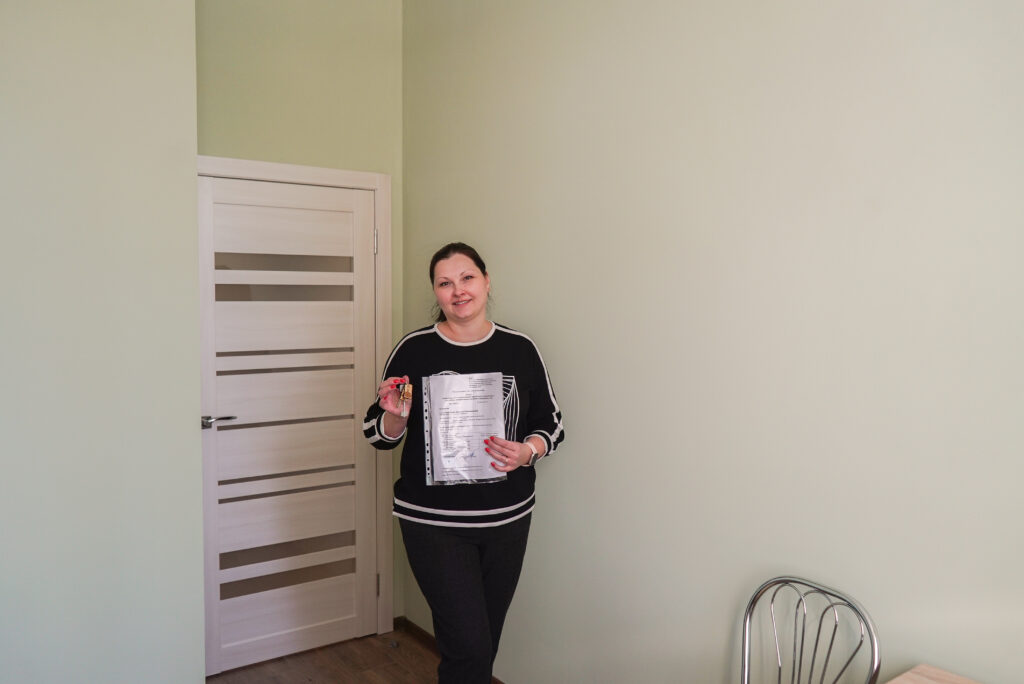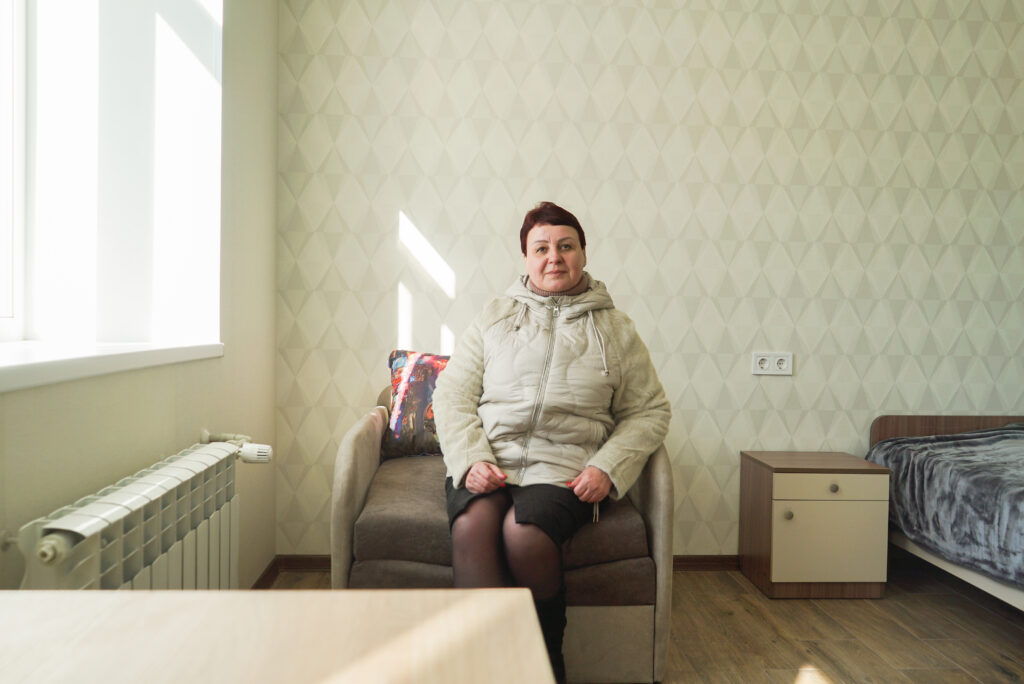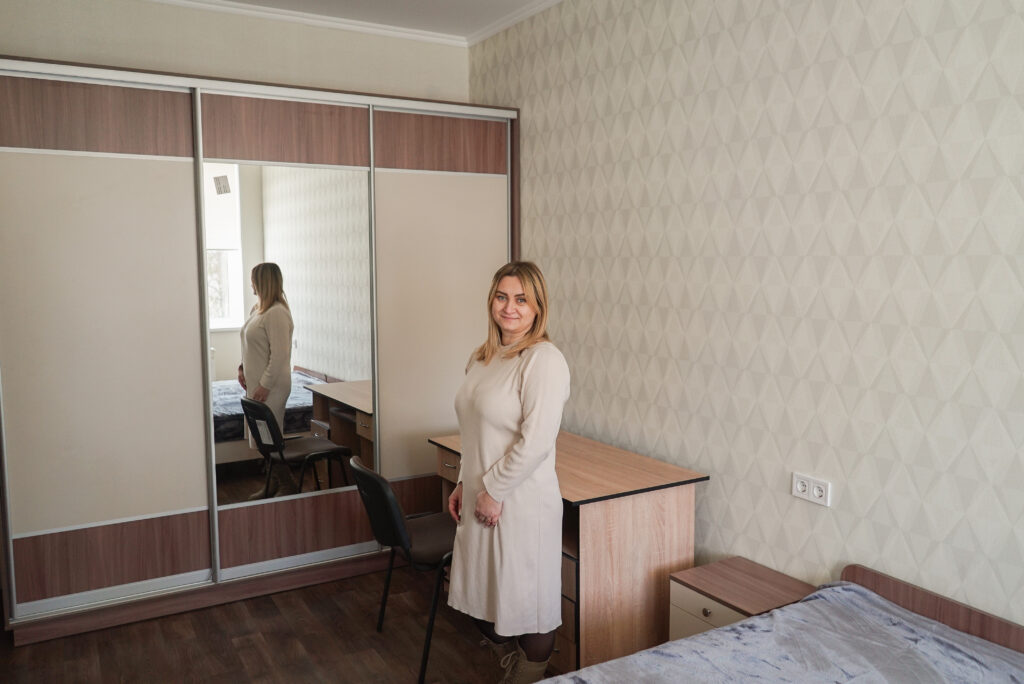08.10.2025 | People
Since the onset of Russia’s full-scale invasion of Ukraine in February 2022, approximately 2,000 internally displaced persons have sought refuge in Zvyahel, in the Zhytomyr region in north-western Ukraine. Among them are Kateryna, Olena, Alla and Olena, who, along with 43 other families, have received new flats in energy-efficient, renovated housing for IDPs through a programme funded by the European Union and managed by Nefco.
Read the people story in Ukrainian
“The armed aggression and moral pressure were hard to endure,” Kateryna shares. “We were invited to move to Zvyahel by relatives of my husband who live here. They provided mental support and helped us find work and somewhere to live initially.” As a former bank credit specialist, Kateryna secured employment as a quality controller at a local garment factory and started rebuilding her life in a new location.
According to estimates by the Ukrainian government, Russia’s full-scale aggression has displaced over eight million people within Ukraine since February 2022. Of these, approximately 2,000 internally displaced persons (IDPs) have found refuge in Zvyahel, a town with some 55,000 residents. One of these IDPs is 39-year-old Kateryna, whose family survived 1.5 months of occupation in her hometown of Oleshky, located in the Kherson region in southern Ukraine, before fleeing in April 2022.
In February 2025, Kateryna and 46 other families moved into newly completed housing for IDPs in Zvyahel. Through the programme EU Support for Urgent Housing Needs for Internally Displaced Persons (IDPs) in Ukraine, funded by the European Union and managed by Nefco, a former blood centre was transformed into an energy-efficient block of flats for war-affected Ukrainians.
With a grant of approximately EUR 2.67 million, the facility and its utility systems underwent comprehensive modernisation, providing 47 turnkey flats equipped with essential furniture and household appliances. The building is also equipped with solar panels and battery storage, enhancing energy resilience. A wheelchair lift ensures accessibility, and a bomb shelter provides safety during airstrikes.
Kateryna is excited about the new flat. “The living conditions in the new housing are much better than in our previous rented flat. The modern facilities are very pleasing.”

Stories of resilience
For 48-year-old Olena, who has moved into the new block of flats alongside Kateryna, the war has meant losing her home twice. “Hostilities forced my family to leave our home and move from Makiivka to Mariupol back in 2014,” she explains. “There, my husband and I found jobs, rented a flat, enrolled our daughter in school and settled down. But, after the full-scale invasion, we had to leave Mariupol as well. Our son lives in Zvyahel, so we came here.”
“Our family has lived through unspeakable horrors, but we survived. The hardships made us stronger: able to adapt to any circumstances,” Olena says. Now working in the HR department at the Zvyahel Palace of Culture, she appreciates the welcoming atmosphere and friendly coworkers. Her daughter has also found joy in dance and theatre, participating in local cultural events. Despite all the challenges, Olena remains optimistic. “We are confident that when the war is over, Ukraine will quickly recover and Ukrainians will live in a peaceful, developed country.”
“Our family has lived through unspeakable horrors, but we survived. The hardships made us stronger: able to adapt to any circumstances”, Olena 48
For 54-year-old Alla, who is the head of the financial department in the local administration of her native Chulakivka community in the Kherson region, continuing to live under occupation was not an option. “As a former deputy of the village council, it was against my beliefs to live under the laws of the invader. Therefore, my husband and I moved to the government-controlled territory of Ukraine,” she explains.
In a new home, Alla maintains the spirit of activism, serving as the head of the IDP council in Zvyahel and dedicating herself to rebuilding Ukraine. “We lost a roof over our heads and are extremely grateful to the Zvyahel community for giving us the opportunity to live in comfort. We will repay this kindness by working hard for Ukraine’s victory and reconstruction; we are strong and courageous and have found the strength to live on with our pain,” she asserts. “One day, the blue-and-yellow flag will fly over the left bank of the Dnieper again and our beloved Kherson region will be as prosperous as it was three years ago.”
“As a former deputy of the village council, it was against my beliefs to live under the laws of the invader. Therefore, my husband and I moved to the government-controlled territory of Ukraine,” Alla, 54

Another resident, Olena, 35, an accountant, moved to Zvyahel to escape the warzone, hoping to return home someday. However, as time passed, she realised that there was nowhere for her to return to. With support from her sister, she and her family started a new life in Zvyahel.
The new flat is a major step for Olena towards building a comfortable life in Zvyahel. “The flat has everything we need, and I am very pleased. I want to express my gratitude to everyone who took part and has supported this vital social project,” she comments.

Strengthening the community
The housing project in Zvyahel is not just about providing shelter for internally displaced persons (IDPs); it’s about fostering social integration and offering a chance for a fresh start. Recreational areas and playgrounds in the surrounding territory, as well as a training room in the building, create opportunities for residents to connect. In this room, the team of the Zvyahel Medical Faculty College of the Zhytomyr Regional Council holds first aid training sessions for IDPs and the broader community.
“Our training includes CPR, controlling blood loss, applying tourniquets and general first aid, skills every Ukrainian should know,” explains Olena Solodovnyk, director of the college. “It is hands-on – not just demonstrations by an instructor – with 60% of the time dedicated to practical exercises.”
Before the renovation of the building, these training sessions were held in temporary locations. “Even before 2022, we conducted training in schools, mostly for people who were interested, for example law enforcement and drivers. Since the Russian invasion started, we offered instruction to everyone. We probably trained up to 3,000 people in the first year of the full-scale war.”
Now, with a dedicated space, the programme continues to expand, ready to empower more residents of the community with life-saving skills.
Zvyahel’s leadership emphasises employment as a cornerstone of successful social integration.
“People are our greatest resource. We have taken important steps to ensure that IDPs who relocate here are anchored in our community with a rich life and employment,” says Mykola Borovets, Mayor inZvyahel. “We even proposed regulatory changes to the Cabinet of Ministers of Ukraine to prioritise offering accommodation to those who have found a job in Zvyahel.”
This sentiment is echoed by Oleksii Riabykin, Deputy Minister for Development of Communities and Territories of Ukraine. “Displaced Ukrainians have enormous potential. They are usually skilled professionals and hard-working people. I think that every community is interested in labour resources and improving their demographic situation.”
Energy efficiency as a shield in war times
Beyond providing refuge, the housing project in Zvyahel revitalised unused municipal property while significantly improving energy efficiency. Annually, heat consumption is expected to decrease by up to 24%, electricity usage by 43% and water consumption by 58%, thanks to implemented energy-efficiency measures, leading to estimated energy cost savings of over EUR 77,500 for the Zvyahel city administration.
As Ukraine faces relentless attacks on its energy infrastructure, transitioning to energy-efficient and green technologies is a priority not only in Zvyahel but nationwide.
“The enemy targets our energy and heating systems. Therefore, transitioning to green energy and energy-saving technologies strengthens our resilience, as energy resources in Ukraine are limited,” Deputy Minister Oleksii Riabykin explains. “With over 40% of Ukraine’s gas production destroyed, reconstruction projects like this provide stability for our communities, contribute to a more sustainable future and improve people’s lives.”
“Our cooperation with the European Union and Nefco has been invaluable. Nefco provided us with vital support, assessing the situation and creating an opportunity to reconstruct this facility. I want to emphasise that I am very grateful to our partners,” says Mykola Borovets, Mayor in Zvyahel.
“Through this programme, the EU is helping Ukrainian communities access not only urgent accommodation but also energy-efficient housing that enhances long-term resilience. These efforts aim to provide displaced people with safe, comfortable homes while contributing to Ukraine’s sustainable future,” says Jocelin Cornet, Head of the Reconstruction, Energy, Infrastructure, and Environment Section of the EU Delegation to Ukraine.
“This project exemplifies how sustainable modernisation can empower communities affected by war and displacement. By providing safe, energy-efficient housing and supporting the integration of IDPs into the local labour market, Zvyahel is setting a national benchmark. With EU funding and Nefco’s support, war-affected Ukrainians are regaining stability, dignity, and hope for a brighter future,” comments Iryna Fedorenko, Programme Manager, at Nefco.
Read more about the project:
Internally displaced families receive accommodation in Zvyahel, Ukraine | Nefco
For further information, please contact:
Iryna Fedorenko, Programme Manager, Nefco
iryna.fedorenko@nefco.int, +380 96 270 9622, +358 50 400 53 82
Tetiana Vehka, Project Administrator, Nefco
T.Vekha@nefco.org.ua, +380 67 519 8034
Photo: Olena and her daughter in their new apartment in Zvyahel.